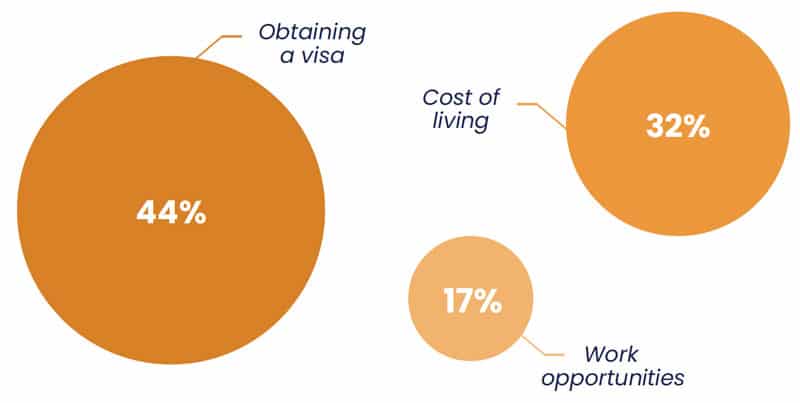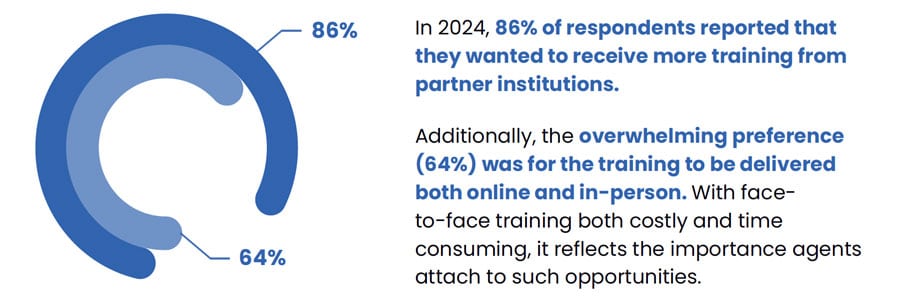Agent survey reveals priorities and shifting preferences of prospective international students
- More than a thousand agents responded to this year’s ICEF Agent Voice survey
- They revealed top concerns of prospective international students
- Frustrations around getting a study visa are high and they affect students’ ultimate choice of destination
The findings from the 2024 edition of the ICEF Agent Voice survey reveal that prospective international students are increasingly concerned about barriers to getting a study visa. Along with affordability and employment outcomes, ease of getting a visa is determining where students choose to study abroad, and it is a factor in the rise of alternative destinations outside the “Big Four.”
This year’s survey focused on areas including recruitment projections, employability, enrolment challenges, destination trends, and student motivations. In all, 1,020 agents across 111 countries responded between April and September 2024.
Why is the survey so important?
As ICEF’s vice-president for the Americas, Ian Cann, notes:
“Agents have a distinct perspective on the marketplace. Because they are dealing directly with students, in some cases from the earliest stages of their study abroad planning, they tend to see shifts in demand or other crucial market trends sooner. We see this coming through loud and clear in this year’s Agent Voice findings, and we greatly appreciate all the insights that responding agents from around the world have shared in the 2024 survey.”
Top findings
While cost-of-living issues are always an issue for a large segment of prospective students, even more pressing this year is the ease of getting a visa (44% versus 32%, respectively). Work opportunities – which are often paramount as a pull factor for study abroad – came in third in this survey, indicating just how difficult agents and students are finding it to secure visas right now.

That said, the report notes that students are overwhelmingly favouring countries that offer post-study work rights: “This has led to students shifting their focus away from Canada, the UK, and Australia – all of which have enacted restrictions – to countries seen as more favourable, including New Zealand, Germany and, at least for now, the US.”
More applications to more destinations
In keeping with findings from other major research this year by IDP, INTO University Partnerships, and others, students are expanding their list of destinations when applying for programmes abroad and are losing interest in Australia (-44%), Canada (-38%), and the UK (-22%) compared with last year. Three-quarters (74%) of agents said they have supported student applications to new destinations in the last two years (up from 63% in 2023).

The survey report adds:
“Alongside policy issues, push factors include both the accommodation shortfall and the cost-of-living crisis, both of which disproportionately affect the Big Four (Australia, Canada, UK, and US). Pull factors include an increasing desire among students to remain closer to home, the aggressive internationalisation strategies of countries such as South Korea and Japan, as well as the growing quality of education around the world, with record numbers of institutions from countries such as India entering the QS rankings this year.
In this context, it is clear that the Big Four are no longer able to rely simply on their historical positioning as desirable destinations … they will need to develop a coherent strategy that focuses on student outcomes in order to maintain their status.”
Agents clamour for more training
A major determinant of agent performance is the amount of direction and training they get from partner institutions. Without this support, they are less likely to be able to highlight key competitive differentiators; to advise students on admissions standards, costs, and best-fit programmes; and to assess whether a student is truly a good fit for a programme/campus. As the following chart shows, agents are eager to receive more training from their institutional partners.

Key takeaways
If there is a major theme emerging this year, it is that many students are experiencing significant barriers in their quest to study abroad, whether these are visa rejection rates and processing delays, new policies around dependants’ rights and post-study work opportunities, cost-of-living increases, or all these combined.
While institutions cannot control the decisions made by immigration departments, there are some things they can do to help students who are experiencing problems while trying to submit applications. A recent survey by Keystone Education found that students are often frustrated by unclear or missing information on institutional websites (63%) and lack of responses to their queries (49%). Keystone advises institutions to check the content of their website to make sure information up-to-date and complete.
There has never been a more important time to nurture student leads from first enquiry all the way to enrolment, and to ensure agents have the training and information they need to send qualified students to your institution. Check out the latest version of ICEF Insights magazine for a special feature devoted to best practices in this regard.
For additional background, please see:
















